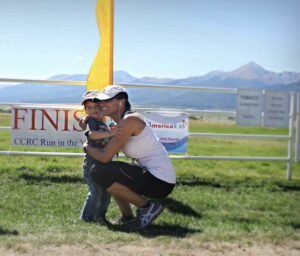“I am so shocked by how common urinary problems are yet how little women talk about them in public. So I wanted to change that.” – Stacy

Just like many new moms, a few months after having a baby boy Stacy returned to her workout routine. After her first run, she noticed something was different.
“I ran for about a mile and a half and when I stopped I realized I was completely wet. I was like, Oh my God, this whole time I have been slowly leaking urine and I had no idea,” says Stacy.
Stacy was very put off by this problem and started to do some research. She reached out to her close friends and family, and many of them told her leaking urine also had happened to them after childbirth.
“I was baffled that it is so common yet it is so hidden and women don’t want to talk about it. Women talk about other things that come with being a new mom like being sore from breastfeeding, but I was confused because no one talked about this.”
Are you one of the women not talking about her incontinence?
Over time, Stacy’s symptoms continued to get worse. She got to the point she was leaking urine anytime she would workout, run, jump, cough or sneeze. She would modify her life to try to reduce the frequency of leaks but it got to a breaking point.
“The last straw for me was on New Year’s, and I got food poisoning. Food poisoning in itself is awful but what made it worse for me was that every time I had to vomit I had to hold a washcloth between my legs so that I would not urinate all over the floor,” Stacy recalls. “This had progressed to the point that it was not just while exercising, and my quality of life was suffering.”
Looking for incontinence options & finding CU Urogynecology
She talked to a friend and neighbor who is a nurse practitioner at an OB-GYN practice and recommended that Stacy make an appointment with a urogynecologist.
“I had never heard of this specialty until she mentioned it to me.”
Per her friend’s suggestion, Stacy set up a consultation appointment with CU Urogynecology and another practice.
“I ended up choosing to be being treated by Dr. Kathleen Connell because I appreciated her personality and enjoyed that she was not pushy and was very forthcoming while explaining my treatment options,” says Stacy. “Also, her whole team is top notch.”
When seeing Dr. Connell, they confirmed Stacy had stress incontinence and uterine prolapse. Stacy shared that she had already worked with her OB-GYN and tried Kegels, pelvic physical therapy and looked at her diet. Together Dr. Connell and Stacy decided that a pessary was the next ideal treatment option. Stacy tried it for six months and thought it did not give her the support she was hoping for.
“I felt it was important for me to try everything before surgery, and the pessary was the last box to check.”
Surgery for uterine prolapse and stress incontinence
When Stacy was ready for surgery, she went back to Dr. Connell who explained the treatment using online diagrams. She had surgery within the month, aiming to get a forever answer. Stacy’s surgery included a uterosacral ligament suspension, sacrocolpopexy, partial hysterectomy, mid-urethral sling procedure, and posterior vaginal wall and perineal body repair.
After surgery, Stacy spent one night in the hospital. Then for the following 8 to 10 weeks, she was prohibited from any heavy lifting, exercising or anything that would cause stress or trauma from the pelvic area.
“I have been really fortunate and have not had any complications or pain.”
Stacy is getting ready for her 8 to 10 week follow-up appointment with Dr. Connell. While Stacy is still under limited activity guidelines and has yet been able to go running, she has noticed a difference and has not experienced any leakage while coughing and sneezing.
“I want to thank Dr. Connell and let her know this was all worth it. There may have been three days post-surgery that I thought, What have I done? But it was all worth it.”
Sharing her experience with other women experiencing bladder leakage
After getting some answers and receiving her surgeries, Stacy knew she needed to do her part to raise awareness about bladder leakage, stress incontinence and uterine prolapse.
“I feel it is important for us to talk about urinary conditions and be supportive of each other. I want to make sure women know there are treatment options, and it does not always have to be surgery.”
One way Stacy reached a larger audience was by doing a Facebook live video about urinary problems after childbirth.
“I had so many women reach out to me privately who thanked me for sharing my story and being vocal about my experience. I heard from many women who thought they were alone in dealing with this.”
Stacy is sharing her story for exactly that reason. She wants women to know they are not alone and there are treatment options – stressing that this is not just part of getting older or something you have to deal with after having children.
You see tons of ED [erectile dysfunction] commercials on the TV. Why can’t women talk about trying to jump on a trampoline with their kids and having to change their underwear? Stacy
During Stacy’s pre-op meeting there were 10-12 other women who were also getting ready to have surgery. Stacy, who is 43, took note that one woman was younger than her but the rest of the room was easily 65 or older.
“I just remember hearing their stories, and a woman next to me said it took her two decades to get to the point where she chose surgery,” says Stacy. “I know everyone’s situation is different but I want women to know that they don’t have to deal with these symptoms for 20 years or just modify their lives for decades before getting treatment.”
Worth traveling to stop leaking urine

Stacy lives in Westcliff, Colorado, and there are not any urogynecologists nearby. The closest doctors specializing in the pelvic floor are three hours away in Denver. Stacy had talked to her OB-GYN about her symptoms early on, and he was able to help some. But when it progressed and she needed more help, she knew it was worth traveling to a specialist.
“When you are dealing with pelvic floor disorders you should go and consult a urogynecologist, who is an expert in this area. It is no different than going to a cardiologist for your heart. With certain conditions it makes sense to go consult the best.”
When talking to women about her experience, Stacy recommends Dr. Connell and the whole CU Urogynecology team.
“We only have one body and our health is important, so if you have access to the best of the best, I would recommend driving to see them.”